Wrongful death lawsuits in Texas allow certain family members to pursue legal accountability when a loved one dies due to someone else’s negligent or wrongful actions. These cases are about more than compensation. They provide a path toward closure, clarity, and justice for families enduring life-altering loss.
An experienced Texas personal injury lawyer can help you understand who may file, what Texas law requires, and how these cases unfold so families can make informed decisions during painful times.
Schedule A Free Case Consultation
What Qualifies as a Wrongful Death in Texas?
A wrongful death occurs when someone dies as a result of another party’s wrongful act, neglect, carelessness, unskillfulness, or default. This definition comes from the Texas Civil Practice and Remedies Code §71.002, which governs wrongful death claims across the state.
For a case to qualify under Texas law, certain conditions must be met. Specifically, the claim must involve:
- A death caused by another’s fault (individual, company, or entity)
- A legal injury that the deceased could have pursued if they had survived
- Financial or emotional harm to survivors as a result
These criteria may sound broad, but wrongful death claims often arise from very specific—and very preventable—events. Some common examples include:
- A fatal crash caused by a distracted or intoxicated truck driver
- A workplace accident due to improper safety protocols
- A commercial vehicle collision involving hours-of-service violations
- Defective products that cause fatal injuries
- Medical negligence resulting in preventable death
Not every unexpected death meets these criteria. There must be a provable link between another party’s conduct and the fatal injury.
Who Has the Right to File a Wrongful Death Lawsuit in Texas?
In Texas, only certain family members may file a wrongful death lawsuit under Texas Civil Practice and Remedies Code §71.004. These include the surviving spouse, children (biological and legally adopted), and parents of the deceased. Each of these groups has equal standing under the law, and they may file either jointly or individually.
What Happens When Family Members Disagree?
Texas law allows any eligible family member to file a wrongful death claim independently of the others. However, disputes between relatives sometimes arise. For instance, a surviving spouse and adult children may disagree on strategy, settlement amounts, or whether to pursue the case at all. In such cases, courts may consolidate claims or appoint a representative to ensure fairness.
Are Common Law Spouses Eligible?
Texas recognizes informal or “common law” marriage in some circumstances. A person claiming to be a common law spouse must prove:
- A mutual agreement to be married
- Cohabitation in Texas
- Representation to others that the couple was married
If these elements are met, a common law spouse may qualify as a surviving spouse and file a claim. Courts examine these claims closely, especially if other family members contest the relationship.
What About Siblings or Fiancés?
Siblings, grandparents, and fiancés are not eligible to file wrongful death claims under Texas law, no matter how close their relationship to the deceased. However, these individuals may still participate in a survival action if the decedent left a will that includes them as heirs.
Can Multiple Family Members File Together?
Eligible family members may file jointly or separately. If multiple parties are entitled to recover, the court may consolidate the claims to streamline the process.
Filing together allows families to share resources, unify legal arguments, and potentially simplify settlement or trial proceedings.
What Happens If One Family Member Doesn’t Want to Sue?
If any eligible party chooses not to join the lawsuit, they are not required to. Their portion of potential damages may be waived or, in some cases, still preserved by the estate’s representative.
Family dynamics can complicate legal decisions after a death. When family members disagree, attorneys may help mediate those concerns while pursuing the case for those who do wish to proceed.
What If No Eligible Family Member Files a Claim?
When a wrongful death occurs in Texas, the law first gives priority to the surviving spouse, children, and parents of the deceased to file a lawsuit. However, if none of these parties initiate legal action within three months of the death, the executor or administrator of the decedent’s estate may file the claim instead.
Role of the Personal Representative
The estate’s personal representative (sometimes called the executor or administrator) is legally empowered to act on behalf of all beneficiaries. In wrongful death claims, this means:
- Filing the lawsuit after three months have passed without family action
- Managing legal proceedings in coordination with probate court responsibilities
- Distributing any recovered damages to eligible family members according to law
Limits on Estate Authority
Even though the estate can file the claim, it cannot override a direct request from the surviving family members. If all eligible family members expressly object to the estate's involvement, the representative may be barred from pursuing the case.
Also, the estate representative cannot pursue non-economic damages for their own benefit. Their role is fiduciary, which means they must act in the interest of the wrongful death beneficiaries, not themselves.
Why Might This Occur?
Sometimes, grief, indecision, or lack of legal awareness prevents immediate family members from filing. In other cases, family members may be estranged or living out of state. The estate’s involvement helps ensure that negligent parties are still held accountable and that time-sensitive evidence isn’t lost.
What Damages Can Be Recovered in a Texas Wrongful Death Lawsuit?
When a loved one dies because of someone else’s negligence, the losses extend far beyond the immediate shock and grief. Texas law recognizes this and allows families to seek compensation for both tangible financial impacts and the deeper emotional toll.
Economic Damages
These are the measurable financial losses that affect a family’s stability and future. They may include:
- Lost earning capacity of the deceased
- Loss of financial support or household services
- Funeral and burial costs (if paid by the survivors)
Non-Economic Damages
These reflect the emotional suffering and loss of personal relationships that no dollar amount can truly replace. Survivors may be entitled to compensation for:
- Mental anguish suffered by the family
- Loss of companionship, society, and affection
- Loss of care, support, guidance, or nurturing
Exemplary (Punitive) Damages
If the death resulted from a willful act or gross negligence, survivors may also recover punitive damages to hold the wrongdoer accountable and deter similar misconduct. These are awarded only in extreme cases.
Important Considerations
Every wrongful death case involves unique circumstances, and Texas law accounts for this in several ways:
- The court may allocate damages among eligible parties based on their relationship to the deceased and their losses
- Texas caps noneconomic damages in certain healthcare liability claims but not in general wrongful death cases
How Wrongful Death Lawsuits Differ From Survival Actions
Wrongful death and survival claims both arise after a fatal incident, but they serve different legal purposes and involve different types of damages. In many cases, families may bring both types of claims together to pursue full accountability under Texas law.
What Is a Survival Action?
A survival action is a lawsuit brought on behalf of the deceased person’s estate for damages the person could have claimed if they had survived the incident. It does not compensate the family for their losses—it compensates the decedent’s estate for the suffering, medical costs, and damages they endured before death.
Texas allows survival actions under Civil Practice and Remedies Code §71.021.
Key Differences Between Wrongful Death and Survival Claims
| Element | Wrongful Death | Survival Action |
| Filed By | Spouse, children, or parents | Estate representative (executor) |
| Purpose | Compensate family for their loss | Compensate decedent for losses before death |
| Damages | Loss of companionship, support, mental anguish | Medical bills, pain and suffering, lost wages before death |
| Beneficiaries | Surviving spouse, children, or parents | Heirs named in the will or by Texas intestacy law |
| Time Limit | 2 years from date of death | 2 years from date of injury, not necessarily date of death |
When Both Claims Are Filed
It’s common for attorneys to file both types of claims, particularly in cases involving extended hospitalization, conscious pain and suffering, or medical treatment before the individual passed away. Filing both helps ensure that all legal grounds for recovery are covered.
Practical Example
Imagine a father suffers severe burns in a truck accident and lives for three weeks in a burn unit before passing away. His children may file a wrongful death claim for their loss, while the estate files a survival action for his pain, medical costs, and emotional distress prior to death.
What Is the Statute of Limitations for Wrongful Death in Texas?
Under Texas Civil Practice and Remedies Code §16.003(b), survivors have two years from the date of death to file a wrongful death lawsuit.
Exceptions May Apply
Although the two-year rule is strict, there are limited circumstances where the deadline may be extended or paused. These include:
- If the claimant is a minor, the deadline may be paused until they turn 18
- If the defendant concealed the cause of death or engaged in fraud
- If the injured party was mentally or physically incapacitated
Even if you believe an exception might apply, it’s critical to speak with an attorney as early as possible to avoid missing this important deadline.
What Proof Is Needed in a Texas Wrongful Death Case?
Winning a wrongful death case in Texas requires more than grief—it requires clear, persuasive evidence that another party’s actions directly caused the death. Legally, four elements must be proven:
- Duty of Care: The defendant had a legal obligation to act with reasonable care
- Breach of Duty: They failed to meet that duty (e.g., a truck driver violated FMCSA regulations)
- Causation: The breach directly caused the death
- Damages: The family or estate suffered losses as a result
To establish these elements, your legal team will typically gather:
- Police and accident reports
- Witness statements
- Medical records
- Employment and income documentation
- Expert analysis (e.g., accident reconstruction, medical opinions)
In truck crash cases, additional time-sensitive evidence is critical. If the wrongful death involved a commercial vehicle, specific evidence must be preserved quickly, such as:
- Driver logs and hours of service records
- Vehicle maintenance reports
- Electronic logging device (ELD) data
- Internal company communications
- GPS, dash cam, or black box footage
Preserving this evidence early is critical. Delays can make it more difficult to access crucial evidence.
Who Can Be Sued in a Texas Wrongful Death Case?
Wrongful death claims often involve multiple potentially liable parties—not just the person directly involved in the incident. Identifying all responsible entities is key to pursuing full compensation.
Depending on the facts of the case, wrongful death lawsuits in Texas may be filed against:
- Individuals (e.g., a negligent truck driver)
- Trucking companies or transportation firms
- Commercial entities responsible for vehicle maintenance or cargo
- Employers of negligent workers
- Manufacturers of defective equipment or vehicles
- Property owners or contractors in workplace deaths
- Government entities (in limited circumstances)
Each case must be carefully evaluated to identify every party that may bear legal responsibility.
Does Insurance Cover Wrongful Death?
In many wrongful death cases, insurance coverage plays a central role in determining the available compensation. Multiple policies may apply, depending on who was at fault and where the incident occurred.
Wrongful death claims may be covered by:
- Auto liability insurance
- Commercial trucking policies (which may exceed $1 million in coverage)
- General business liability policies
- Homeowners insurance (in limited scenarios)
- Product liability insurance
Negotiating with insurers requires understanding policy limits, exclusions, and strategies insurers use to minimize payouts. Experienced attorneys help families uncover all potential sources of compensation.
How Long Do Texas Wrongful Death Lawsuits Take?
There’s no set timeline, but many cases resolve within 12 to 24 months. Factors that influence timing include:
- Complexity of evidence
- Number of defendants
- Willingness of parties to negotiate
- Whether the case proceeds to trial
Some settle within months; others may take years, especially if punitive damages or appeals are involved.
Common Challenges in Texas Wrongful Death Lawsuits
Wrongful death cases often present difficult legal and emotional hurdles. Common challenges include:
- Disputed liability: Defendants may deny fault or shift blame
- Missing or destroyed evidence: Especially in commercial vehicle crashes
- Multiple defendants: Coordination across parties may slow resolution
- Family disagreements: Conflict over whether or how to pursue a case
- Emotional distress: Litigation can intensify grief and strain
Having a legal team that communicates clearly and compassionately helps families navigate these challenges with confidence.
Why Understanding Your Rights Matters
Even though Texas law provides a path to justice, many families are unaware of their rights. Knowing who can file, what damages are recoverable, and how the process works helps families protect their loved one’s legacy.
Filing a wrongful death lawsuit in Texas:
- Preserves vital evidence before it’s lost or destroyed
- Holds negligent parties accountable
- Provides clarity and answers in the face of tragedy
- May provide financial relief that helps families move forward
FAQ for Who Can File a Wrongful Death Lawsuit in Texas
Who can sue for wrongful death in Texas?
Only the surviving spouse, children, or parents of the deceased may file. If none of them do so within three months, the estate's representative may bring the claim unless explicitly asked not to.
What damages are recoverable in a Texas wrongful death case?
You may recover lost income, funeral expenses, emotional distress, loss of companionship, and in some cases, punitive damages for gross negligence.
Can adult children sue for a parent’s death?
Yes. Adult children have the same right to file a wrongful death claim as minors, even if financially independent.
What if multiple family members want to file?
They can file jointly. If they don’t agree, they can file separately, and the court may consolidate the cases.
Is there a deadline to file a wrongful death lawsuit in Texas?
Yes. You generally have two years from the date of death to file, although certain exceptions may apply.
Seeking Clarity After Loss? We Help Families Understand Their Legal Options
Navigating life after a wrongful death is never easy. Whether you're unsure about your legal rights or wondering if you're eligible to file a claim, understanding Texas law is the first step toward informed decisions.
At Cowen | Rodriguez | Peacock, we believe families deserve answers and accountability. We focus on complex trucking and wrongful death cases, using extensive resources to uncover the truth and build strong cases with clarity, care, and precision.
Call (210) 941-1306 for a free consultation. No cost unless we recover compensation for your loss.
Let us help your family move forward with the legal guidance and clarity your family needs during a difficult time.


